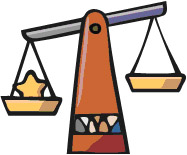Have you noticed that trying to have a ongoing close relationship with someone who is more insecure or troubled than you are can be difficult, tiring and too much "work" (work meaning toil and strain)? Have you ever witnessed a close relationship where one person was giving more than the other? Economists have an analysis technique that identifies and compares all expenditures of every type and all benefits of every type of a project; it's called a cost / benefit analysis. A rational person or business will enter into any transaction where the personal benefits are greater than costs incurred. There is a similar energetic rule for interpersonal associations that are voluntary. Call it the Law of Even Energy Exchange, or EEE, and it says:
Mutual emotional, mental, physical and energetic exchanges must be roughly even in some way in order for all parties to be satisfied enough to sustain the relationship in any healthy kind of manner.
The Law of Even Energy Exchange
The key concept here is balanced reciprocity. You and I will both choose to stay friends as long as the rewards are larger than the costs (as long as we are free of self destructive feelings). If you and I have a roughly even give and take of some sort of energy, we will feel good about our connection. People refer to this as getting as much as you give.
Don't get confused here about the nature of costs and benefits. It can get tricky to identify what exactly the participants are getting from their affiliations. Realize that the rewards stemming from people connections are not usually monetary, but are rather more often emotional, physical, spiritual, or mental. What we give in voluntary social interactions is more than our money; it is our time, our attention, our mind, our energy, our hearts. Does this make sense?
It is hard to maintain a mutual connection without some even reciprocity of some sort over the long term. In the long run, some member of an unbalanced involvement will do something such as back away, get angry, or pull a stunt, to change it. A relationship cannot continue at an uneven level due to EEE.
One of the more surprising results of the EEE Law is that, more often than not, the persons receiving more than they are giving are the ones to break the connection. The "givers" of the broken relationship, who gave the other everything!, will experience shock and meltdown when the "taker" flakes. In my job I see this all the time.
This is counter logical until we understand EEE. At some level everyone involved is aware of the energetic imbalance and something has to happen, as these systems cannot be maintained as they are. Rarely do you see a conscious awareness of all this though; if people were conscious of it, they would do something consciously to fix the system. As it is you will find, littered all over the psychic landscape, the carcasses of care-giver/care-getter relationships where the taker had to take off for some random, sudden and not very logical reason.
Test for EEE and Balance
There is a quick way to tell if a relationship operates with EEE: do the people involved seem happy and healthy? How do your relationships feel to you? If you get the sense of upliftment, peace, contentment, or happiness about relations with others, then you are fine and I doubt you would see the need to change anything there.
How can you test whether you are giving or taking too much in a relationship (thus violating the Law of EEE)? Here are some of my observations on determining whether boundaries have become enmeshed or the energetic balance is off.
If you taking on too much, for instance giving more that the relationship requires, or taking on other peoples' stuff and carrying it for them, a good keyword is drained. In these cases you could feel worn out, exhausted, over worked, tired, weary, put out, nervous, tense, anxious, worried, critical, dissatisfied, rejected, unacknowledged, or unappreciated. Those feelings can indicate that you are making yourself responsible for something that doesn't belong to you -- either the other's feelings or for their half of the connection.
There is the converse to the above. If someone is giving more to a relationship than you are, or if you are not holding up your end, or if you are allowing someone to carry your feelings and worries for you, the keyword is resistant. You might feel the following: strained, restrained, inhibited, withholding, numb, resentful, defiant, rebellious, disdainful, uncaring, uninvolved, indignant, passive, detached, disinterested, dull, reactive, or manipulated.
And if all those sound like being a teenager, there is good reason for it.
 This post is an excerpt from Superconscious Relationships: The Simple Psychic Truths of Perfectly Satisfying Connections, available from O Books September 2010. Questions, comments and ideas? Bring'em on! Contact Psychic Margaret Ruth on her Facebook page, email mr@margaretruth.com or call 801-575-7103. You can also get details on private readings, Margaret's classes and blog at www.margaretruth.com.
This post is an excerpt from Superconscious Relationships: The Simple Psychic Truths of Perfectly Satisfying Connections, available from O Books September 2010. Questions, comments and ideas? Bring'em on! Contact Psychic Margaret Ruth on her Facebook page, email mr@margaretruth.com or call 801-575-7103. You can also get details on private readings, Margaret's classes and blog at www.margaretruth.com.